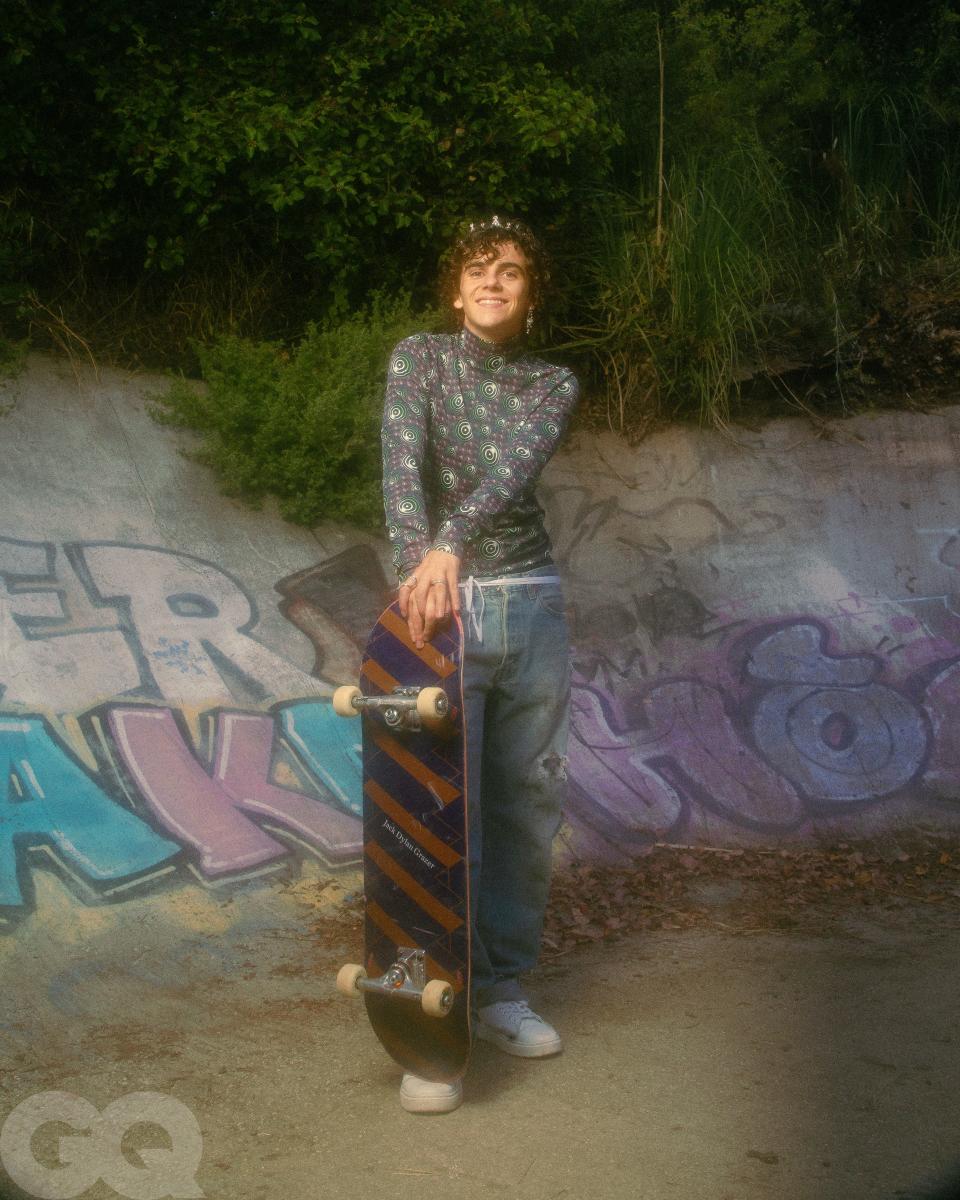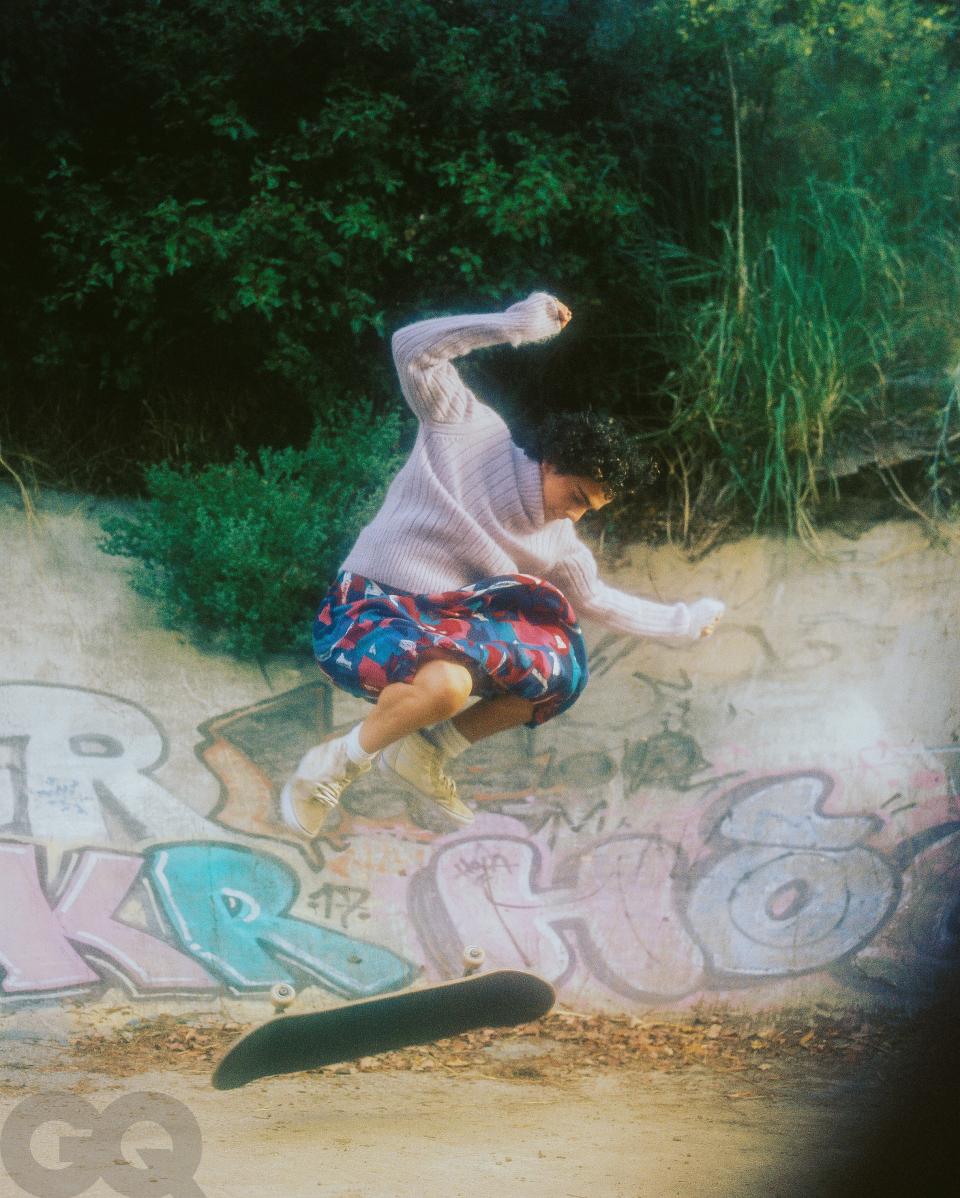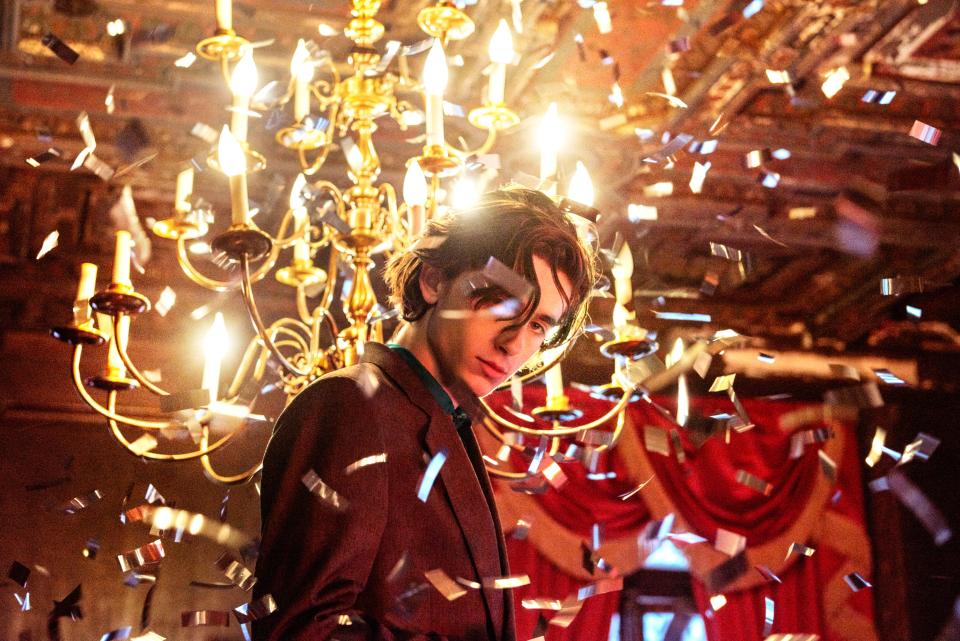Jack Dylan Grazer Discovers Who He Is in Luca Guadagnino's We Are Who We Are
A few years ago, Jack Dylan Grazer took a trip to the movie theater. He was in Toronto and it was one of his days off from filming Shazam!, the DC comedy in which he plays the shape-shifting hero’s foster brother. He decided to watch Call Me By Your Name, and he immediately fell for it. Grazer took note of the director’s name that appeared in the credits—Luca Guadagnino—and turned to his mother.
“I want to work with him,” he told her. With eerie prescience, she assured him: “You will.”

Whether Grazer, now 17, has a knack for manifestation, or it was all just happenstance, his wish came true in the form of We Are Who We Are, Guadagnino’s coming of age drama which follows a group of army brats living on an American military base in Italy. Thematically, the show is something of a spiritual successor to Call Me By Your Name: Grazer plays Fraser, a tempestuous 14-year-old with a pair of headphones constantly plugged in his ears. He’s the new arrival at the base with his mothers (Chloë Sevigny and Alice Braga), and quickly forms a deep bond with his neighbour, Caitlin (Jordan Kristine Seamon), as they both wrestle with their sexuality and identity in the midst of domestic troubles and teenage debauchery.
“He’s an enigma to himself,” Grazer says of his character. “He doesn’t really understand a lot of the things he does but he’s so forthright so he convinces himself that he knows everything. He feels like other people don’t deserve his intelligence. But he’s also very volatile and aggressive at times, and not because he’s coming from an angry place but because he’s constantly questioning who he is.”
If Fraser is just beginning his coming of age when we first meet him, Grazer is inching closer to the end. Starring in enormous blockbusters including It, he became the Loser Club’s resident hypochondriac at age 12 and a superhero’s sidekick by 15. His films have grossed a combined total of over $1.5 billion. Suddenly the stakes are multiplied tenfold during what are ostensibly, and horrifyingly, the most awkward years of your life. Every misstep is now being monitored, examined through a microscope of millions. (See: His 3.8 million fans on Instagram, to say nothing of the countless stan accounts.) Child fame is a disarming transaction like that: a stable career and all the other perks of being a celebrity, but at the cost of normalcy. That unalleviating pressure forces a kid to mature fast.

Grazer is acutely aware of this fact, admitting outright that he’s “not a normal person.” But he wouldn’t have it any other way.
“I became 70 when I was 7!” he laughs. “I don’t know if I really had much of a childhood. But I didn’t want to. I wanted to grow up really fast.”
Nevertheless, he’s still 17. When we meet over Zoom, his shoulder length curls are damp and disheveled (he just got out of the shower), his black painted fingernails contrast with his brightly-lit, white bedroom as he rests his face on his hand. It’s a Saturday morning and he looks tired: It’s his first week back at school, which has traded classrooms for hours of video calls reminiscent of the one we’re currently on. “It feels like the days are shorter because the teachers don’t want to torture their students by keeping them on a computer for six hours a day,” he tells me. “You do miss the social aspect of being at school.”
If you were to judge Grazer by what’s out there on the internet, you’d expect an anarchic and relentless bundle of energy. A quick YouTube search brings up results like “jack dylan grazer being a drama queen” and “jack dylan grazer being chaotic in interviews for 4 and a half minutes straight.” He trolled a YouTube gamer on Instagram Live. His TikToks are inscrutable.
But here, he’s incredibly earnest, as he excitedly talks about his skateboarding hobby (a skill he picked up after auditioning for Mid90s) and his attempts to learn the flute (“I need to learn how to read sheet music, but it’s like reading Hebrew!”). He’s calm and thoughtful, as if this project we’re discussing requires a shift in sensibility.

For Grazer, acting had always simply been fun. While other kids might take up a sport or get hooked on video games, he performed in musical theater with the Adderley School because he “just wanted to play.” His roles so far have been reflective of his carefree approach to the job: Up until now, he’s portrayed best friends with biting one-liners, or the younger version of the protagonist in a flashback. It is a prime example of both. In the horror franchise, Grazer plays a neurotic germaphobe running from a fear-eating clown, but in reality, the film felt like “summer camp.” Both films never felt like work; he just learned his lines and got to hang out on extravagant sets with his best friends. Likewise, school amounted to being pulled off set by a teacher in between takes to cram in the mandatory hours.
But with We Are Who We Are, he steps into his first leading role, one that required him to convey longing and confusion through Elio-like physicality and subtext. It’s abnormal to talk about the show as a turning point for an actor who isn’t even a legal adult yet, but Grazer explains that the show required him to radically change his approach to acting. He spent six months in Italy (“It felt like I was in Call Me By Your Name.”) and built up the character beyond what was on the page in collaboration with Guadagnino. “His philosophy is that we know our characters better than anyone else—even the writers—because we are the characters essentially,” he explains.
In many ways, Grazer absorbed that philosophy entirely. He describes the experience less as a performance and more like a “rebirth”—perhaps even an attempt at method acting. Over those months in Italy, the distinctions between actor and character gradually became indistinguishable. “I had no other choice but to act and surrender to Fraser entirely and throw Jack Dylan Grazer out the window,” he says. “I would go out and get a coffee as Fraser and walk like Fraser. That was just me trying to get into [character], but then I slipped at some point and just became Fraser.”
One day on set, he looked at himself in the mirror, and the hardened kid standing there with a bleach-blond dye job and oversized shorts was unrecognizable to him. He could only see Fraser. While talking about his character, he seems to unintentionally switch pronouns, from “he” to “I”, as if the two still remain one and the same.

The process was so transformative that it forced him to re-evaluate himself entirely. “I never really struggled with identity before,” Grazer tells me. “But I think the show opened up my eyes to question myself. Being Fraser forced me to question what I wanted and what I stood for and what I believed in. At some points, the show bled into reality.”
When asked how he has changed, he takes a pause and a pensive swivel in his armchair, unsure of how to answer. “I think I was more ignorant before I did the show,” he says, and he leaves it at that.
Coming of agers are a particularly well-trodden genre, but there’s a naturalistic, raw energy to We Are Who We Are that is distinctive from what we’ve seen before. Each character quietly struggles with their own problems and growing pains—for Fraser, it’s his sexuality. Caught in a fraught relationship with his lesbian mother and an infatuation with another man, his story doesn’t tick off the familiar beats. His personal discovery is instead internal and intimate. "I think every single person born as a boy has this guard. It’s this guard that they don’t even realize they have, where they’re initially like, ‘Being gay? I could never.’ But we’re all born as humans who are attracted to whatever we’re attracted to," he says. "I think that’s how Fraser interprets it as well. Yes, he’s reserved and nervous about it in the beginning because he’s unlocking this new idea for himself. He’s figuring it out, and that’s what you see in the show: him coming to terms with this idea."


As our conversation winds to a close, I ask him if Martin Scorsese ever visited the set—his daughter, Francesca, plays the confident cool girl of the show’s teen cohort—and his eyes widen. “That was actually a really stressful day,” he divulges. Still, he revels in the memory, speaking so fast it’s like someone has put him on 2.5x speed as he shows off his impersonation of Guadagnino. The director was so nervous about Scorsese’s presence that production halted that day.
“Luca was like, ‘I cannot do this today because Martin Scorsese is on my set. I don’t know what to do, this is not good for me. I will have a panic attack before the day ends,’” Grazer says in his best Italian accent. “It’s like if you’re a painter and Van Gogh shows up.”
Admittedly, Grazer is also a self-proclaimed superfan of the Wolf of Wall Street director, and afterwards, he got to spend several days with his idol, as they went on lavish restaurant outings in Italy and talked about anything and everything.
He takes a second to compose himself. A giddy, Cheshire cat smile spreads across his face. The kid in him comes flooding back.
“...Oh my god!” he yells. “I met Martin Scorsese!”
PRODUCTION CREDITS:
Styled by Tiffany Briseno and Lyn Holmes
Grooming by Sonia Lee for Exclusive Artists using Kevin Murphy
GQ Cover Story
Every once in the rarest while, a young actor shows up in a movie like an alien—anonymous and yet in possession of such preternatural talent that audiences start thinking about the actor’s future not in years but in decades. Call Me by Your Name’s Timothée Chalamet is just such an alien, and just such a once-in-a-generation talent.
Originally Appeared on GQ


